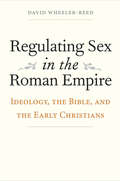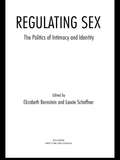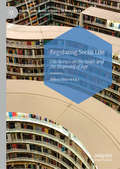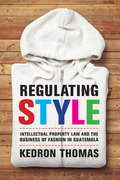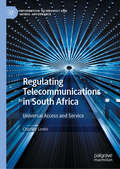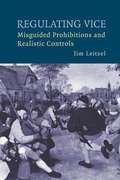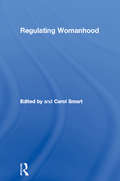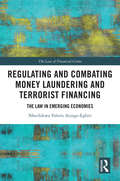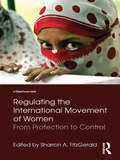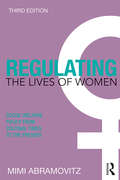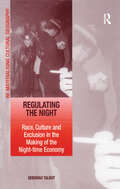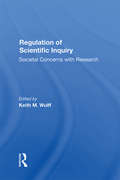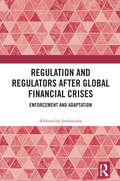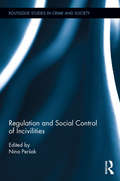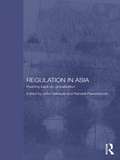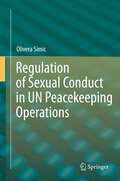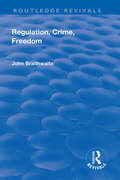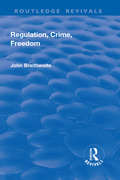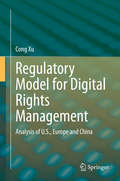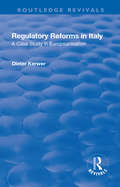- Table View
- List View
Regulating Screens
by Ronald Cohen André CaronThe digital age has carried with it a tsunami of change. Children who have grown up with the delivery platforms that are a part of that change are now able to absorb more and more unregulated media on their own, often without any supervision. Bedroom computers, tablets, and smart phones provide private, individualized access to all kinds of content that may not be suitable for children. What rules and regulations exist to counter this potentially threatening environment? In Regulating Screens, André Caron and Ronald Cohen examine how governments and non-governmental organizations have been doing their part to make television and the Internet safer for children. In practical terms, they provide parents, educators, and politicians with an up-to-date inventory of the existing laws, codes, and standards in Canada, as well as information on who administers them and how they can be accessed. Given the Internet's global reach, Caron and Cohen also describe access controls in place in the United States, Australia, the United Kingdom, and the European Union. Regulating Screens offers efficient access to otherwise scattered and difficult-to-find information; it is essential reading for anyone interested in how to safeguard children against risky content, whether accessed on broadcast or virtual platforms.
Regulating Screens: Issues in Broadcasting and Internet Governance for Children
by André H. Caron Ronald I. CohenThe digital age has carried with it a tsunami of change. Children who have grown up with the delivery platforms that are a part of that change are now able to absorb more and more unregulated media on their own, often without any supervision. Bedroom computers, tablets, and smart phones provide private, individualized access to all kinds of content that may not be suitable for children. What rules and regulations exist to counter this potentially threatening environment? In Regulating Screens, André Caron and Ronald Cohen examine how governments and non-governmental organizations have been doing their part to make television and the Internet safer for children. In practical terms, they provide parents, educators, and politicians with an up-to-date inventory of the existing laws, codes, and standards in Canada, as well as information on who administers them and how they can be accessed. Given the Internet's global reach, Caron and Cohen also describe access controls in place in the United States, Australia, the United Kingdom, and the European Union. Regulating Screens offers efficient access to otherwise scattered and difficult-to-find information; it is essential reading for anyone interested in how to safeguard children against risky content, whether accessed on broadcast or virtual platforms.
Regulating Sex in the Roman Empire: Ideology, the Bible, and the Early Christians
by David Wheeler-ReedA New Testament scholar challenges the belief that American family values are based on “Judeo-Christian” norms by drawing unexpected comparisons between ancient Christian theories and modern discourses Challenging the long-held assumption that American values—be they Christian or secular—are based on “Judeo-Christian” norms, this provocative study compares ancient Christian discourses on marriage and sexuality with contemporary ones, maintaining that modern family values owe more to Roman Imperial beliefs than to the bible. Engaging with Foucault’s ideas, Wheeler-Reed examines how conservative organizations and the Supreme Court have misunderstood Christian beliefs on marriage and the family. Taking on modern cultural debates on marriage and sexuality, with implications for historians, political thinkers, and jurists, this book undermines the conservative ideology of the family, starting from the position that early Christianity, in its emphasis on celibacy and denunciation of marriage, was in opposition to procreation, the ideological norm in the Greco-Roman world.
Regulating Sex: The Politics of Intimacy and Identity (Perspectives on Gender)
by Elizabeth Bernstein Laurie SchaffnerRegulating Sex is an anthology that presents debates over the role of the state in constructing and controlling erotic practice, intimacy, and identity. The purpose of this edited volume is to address sexual dilemmas in law and the state in substantive areas such as same-sex domestic partnerships, sexual economies, and childhood sexuality via a series of spirited dialogues between socio-legal scholars from diverse disciplinary, national, and political perspectives.
Regulating Social Life: Discourses on the Youth and the Dispositif of Age (Postdisciplinary Studies in Discourse)
by Helena OstrowickaThis book presents the original concept of the ‘dispositif of age’, combining post-Foucauldian analytics of the dispositif, discourse and governmentality with the historical semantics of Reinhart Koselleck to explore the functions of the notion of youth in the regulation of social life. Making use of examples from sources including scientific and media statements, youth policy programmes, and strategies at international (European) and local (Polish) levels, the author shows how this concept of youth supports processes of social regulation and contributes to the implementation of political goals as specific responses to issues such as radicalization and violence, unemployment, and economic crisis. This book will be of interest not only to scholars of discourse and youth studies, but also to all post-Foucauldian researchers with an interest in going beyond simple 'applicationism'.
Regulating Style: Intellectual Property Law and the Business of Fashion in Guatemala
by Kedron ThomasFashion knockoffs are everywhere. Even in the out-of-the-way markets of highland Guatemala, fake branded clothes offer a cheap, stylish alternative for people who cannot afford high-priced originals. Fashion companies have taken notice, ensuring that international trade agreements include stronger intellectual property protections to prevent brand "piracy." In Regulating Style, Kedron Thomas approaches the fashion industry from the perspective of indigenous Maya people who make and sell knockoffs, asking why they copy and wear popular brands, how they interact with legal frameworks and state institutions that criminalize their livelihood, and what is really at stake for fashion companies in the global regulation of style.
Regulating Telecommunications in South Africa: Universal Access and Service (Information Technology and Global Governance)
by Charley LewisThis book provides the first full account of the 20-year story of universal access and service in South Africa’s ICT sector. From 1994 the country’s first democratic government set out to redress the deep digital divide afflicting the overwhelming majority of its citizens, already poor and disenfranchised, but likewise marginalised in access to telephone infrastructure and services. By this time, an incipient global policy regime was driving reforms in the telecomms sector, and also developing good practice models for universal service. Policy diffusion thus led South Africa to adopt, adapt and implement a slew of these interventions. In particular, roll-out obligations were imposed on licensees, and a universal service fund was established. But an agency with a universal service mandate was also created; and licences in under-serviced areas were awarded. The book goes on to identify and analyse the policy success and failure of each of these interventions, and suggests some lessons to be learned.
Regulating Vice: Misguided Prohibitions And Realistic Controls
by Jim LeitzelRegulating Vice focuses on public policy toward traditional vices such as alcohol, nicotine, drugs, gambling, and commercial sex. It explains why vice prohibitions generally are misguided, and also describes the dangers of unfettered access to alcohol, cocaine, or heroin. Sin taxes, advertising restrictions, licensing, and subsidies to treatment are all potentially desirable components of balanced vice policies. Regulating Vice brings a sophisticated analysis to vice control, an analysis that applies to prostitution as well as drugs, to tobacco as well as gambling, while remaining accessible to a broad audience.
Regulating Womanhood
by Carol SmartThis collection of original essays looks at a topic of growing interest and debate in feminist and historical circles: the social regulation of women through law during the 19th and 20th centuries, and the resistance which emerged in response. The collection refutes the notion of women oppressed during the 19th century, unable to act in opposition to the law. When issues of motherhood and women's sexuality became areas of public policy, women began to negotiate the law, as case studies from Europe and the USA show. This book should be of interest to students of women's studies, sociology of law, and social policy.
Regulating and Combating Money Laundering and Terrorist Financing: The Law in Emerging Economies (The Law of Financial Crime)
by Nkechikwu Valerie AzingeThis book analytically reviews the impact of the global anti-money laundering and counter-terrorist financing (AML/CFT) framework on the compliance trajectory of a number of jurisdictions to this framework. The work begins by examining the international financial sector reform and its evolution to inculcate the global framework for AML/CFT regulations. It challenges the resulting uniform AML/CFT due to its paradoxical impact on the compliance trajectory of African countries and emerging economies (ACs/EEs). This is done through an examination of the pre-conditions for effective regulation and compliance drivers for ACs/EEs that reveals the behavioural impact of the AML/CFT standards on the bloc of countries. Through the application of agency theory, it explores the relationship between ACs/EEs on the one hand and the international financial institutions that formulate, disseminate and facilitate compliance with the global framework for AML/CFT standards on the other. The remaining chapters review empirically the compliance pressures and resulting compliance trajectory of ACs/EEs with the AML/CFT standards. The final part of the book provides a detailed explanation of the compliance challenges of ACs/EEs and the legitimacy concerns that facilitate this. This book offers a new direction on the impact of global AML/CFT standards on ACs/EEs and contributes to the understanding of the conditions under which the global standards are likely to facilitate proactive compliance within these blocs of countries. As such it will be a valuable resource for academics, researchers and policy-makers working in this area.
Regulating the End of Life: Death Rights
by Sue WestwoodDeath Rights is a collection of cutting-edge chapters on assisted dying and euthanasia, written by leading authors in the field. Providing an overview of current regulation on assisted dying and euthanasia, both in the UK and internationally, this book also addresses the associated debates on ethical, moral and rights issues. It considers whether, just as there is a right to life, there should also be a right to death, especially in the context of unbearable human suffering. The unintended consequences of prohibitions on assisted dying and euthanasia are explored, and the argument put forward that knowing one can choose when and how one dies can be life-extending, rather than life-limiting. Key critiques from feminist and disability studies are addressed. The overarching theme of the collection is that death is an embodied right which we should be entitled to exercise, with appropriate safeguards, as and when we choose. Making a novel contribution to the debate on assisted dying, this interdisciplinary book will appeal to those with relevant interests in law, socio-legal studies, applied ethics, medical ethics, politics, philosophy, and sociology.
Regulating the International Movement of Women: From Protection to Control
by Sharron FitzGeraldFirst Published in 2013. The relationships between governments and the everyday lives of women has long been the focus of attention among feminists. Feminist scholarship critiques women’s lives, experiences and gender inequality in a variety of contexts. In this age of increased internationalism, we are witness to government attempts to use women’s alleged ‘vulnerability’ to justify its humanitarian interventions. Regulating the International Movement of Women interrogates Western governments’ use of discourses of human vulnerability as a tool to regulate non-Western women’s migration. In this collection of provocatively argued essays, the contributors wish to reclaim the concept of racialised and gendered vulnerability, from its under-theorised, and thus, ambiguous location in feminist theory.
Regulating the Lives of Women: Social Welfare Policy from Colonial Times to the Present (Women's Studies)
by Mimi AbramovitzWidely praised as an outstanding contribution to social welfare and feminist scholarship, Regulating the Lives of Women (1988, 1996) was one of the first books to apply a race and gender lens to the U.S. welfare state. The first two editions successfully exposed how myths and stereotypes built into welfare state rules and regulations define women as "deserving" or "undeserving" of aid depending on their race, class, gender, and marital status. Based on considerable new research, the preface to this third edition explains the rise of Neoliberal policies in the mid-1970s, the strategies deployed since then to dismantle the welfare state, and the impact of this sea change on women and the welfare state after 1996. Published upon the twentieth anniversary of "welfare reform," Regulating the Lives of Women offers a timely reminder that public policy continues to punish poor women, especially single mothers-of-color for departing from prescribed wife and mother roles. <P><P> The book will appeal to undergraduate, graduate, and postgraduate students of social work, sociology, history, public policy, political science, and women, gender, and black studies – as well as today’s researchers and activists.
Regulating the Night: Race, Culture and Exclusion in the Making of the Night-time Economy (Re-materialising Cultural Geography Ser.)
by Deborah TalbotThe promotion of night-time economies in town centres across Britain has sparked new fears about disorder, violence and binge-drinking. However, there has been little consideration of the social and cultural benefits of a diverse urban nightlife. This timely work examines the processes that have led to a mainstreaming of subcultural expression at night, and the impact of legislation aimed at providing the police and councils with new powers to manage and contain the ’social problem’ of contemporary nightlife. Based on an ethnographic study of a London locality, the book examines the unwitting consequences of local decision-making, and the contradictory struggles that ensued. Utilizing the concept of the 'outsider area' as a space that stands outside of conventional norms, and where cultural innovation and transgression can occur, it explores the social consequences of losing contact with the 'other'.
Regulation Of Scientific Inquiry: Societal Concerns With Rersearch
by Keith WulffThe increase in regulations affecting the conduct of scientific research, and the debate about their appropriateness and effectiveness, reflect societal concerns with fundamental questions raised by certain types of scientific inquiry. This book addresses issues of ethics, accountability, and conflict as they relate to the rights of inquiry, the rights of citizens, and the role of government in a research-oriented society.
Regulation and Criminal Justice
by Graham Smith Hannah Quirk Toby SeddonWhile regulatory institutions and strategies have been the subject of increasing academic attention, there has been limited application of regulatory theories to criminal justice scholarship. This collection of essays from a range of outstanding international scholars adopts a critical, inter-disciplinary approach, providing an innovative application of regulatory theory to the practice of criminal justice and offering suggestions for further research. Part I explores the aims and values of criminal justice and other regulatory networks and the synergies and tensions between these fields; Part II examines criminal justice as a regulatory force to control 'deviant' and anti-social behaviour and Part III examines the regulation and oversight of criminal justice through the operation of prison inspectorates and explores notions of responsive justice.
Regulation and Regulators after Global Financial Crises: Enforcement and Adaptation
by Aleksandra JordanoskaThis book provides an original theoretically and empirically grounded analysis of regulatory enforcement activism in post-crisis periods and the ensuing regulatory interactions. It critically addresses the ‘more regulation’ enforcement agenda relating to financial misconduct in the aftermath of the 2008 financial crisis, showing how misconduct was constructed through the enforcement policies and practices of the powerful UK financial conduct regulator and its interactions with the subjects of enforcement proceedings and their legal representatives during a tumultuous time in the financial markets. Drawing from interviews with regulators, professional intermediaries, and markets participants; documentary analysis of enforcement decisions and speeches; and observations, the volume adopts an interdisciplinary approach grounded in social constructivist perspectives on compliance and deviance, regulation theory, and socio-legal research. Through a multi-dimensional analytical framework of regulatory enforcement activism that links shifts in regulatory policymaking; experimentations with legal powers in information-gathering, legal and extra-legal penalties, and individual accountability; and the use of enforcement tools in micro-level interactions, the book documents a more interventionist and punitive post-crisis enforcement agenda. The findings challenge current thinking in the 'scandal and reform' literature. The work argues that despite the increased focus on enforcement, it is not necessarily the case that the power has tilted more towards the regulator. This fine-grained socio-legal enquiry makes innovative and timely theoretical contributions to our understanding of the limitations of regulatory activism and regulatory control, regulatory relationships, the governance of financial markets, and broader thinking on regulating corporations and the individuals within them. It will appeal to academics, researchers, regulators, and policymakers working in regulation across law, criminology, sociology, and politics.
Regulation and Social Control of Incivilities (Routledge Studies in Crime and Society)
by Nina PersakThe increasing trend and prevalence of incivilities-targeting punitive regulatory measures across Europe raises important issues regarding the legitimacy, effectiveness and impact of such formal social control. Regulation and Social Control of Incivilities addresses the pertinent issues of current punitive regulation and the social control of incivilities, their trends, criminological explanations, political, spatial, cultural, representational and policing dimensions as well as the underlying behaviour it targets. Part I explores issues surrounding the regulation of incivilities, drawing examples from several European countries including Spain, Italy, Great Britain, Belgium, Slovenia and Hungary. It inspects the legal form and content of the prohibition of incivilities and the social factors that can help explain it, as well as the effectiveness and societal impact of various anti-nuisance measures. Part II focuses on social control and the representation of incivilities, including the construction and control of public nuisance in Belgium, the spatial and cultural aspects of incivilities and of law enforcement against them, the media representations of incivilities in the British and Flemish press, and the intersections between migration and control of incivilities when policing in the Netherlands. This book brings together international scholars to examine the ways in which understudied European countries approach the issue of anti-social behaviour. This multidisciplinary text will be of interest to students, scholars and policymakers concerned with issues of social control, incivilities and criminalisation.
Regulation in Asia: Pushing Back on Globalization
by John Gillespie Randall PeerenboomUnlike much analysis about regulation in Asia which focuses on globalisation and the transplant effect, leaving domestic influence over commercial regulation under-researched and under-theorized, this book focuses on how local actors influence regulatory change. It explores the complex economic and regulatory factors that generate social demand for state regulation and shows how local networks, courts, democratic processes and civil society have a huge influence on regulatory systems. It examines the particular circumstances in a wide range of Asian countries, provides transnational comparisons and comparisons with Western countries, and assesses how far local regulatory regimes increase economic value and convey competitive advantages.
Regulation of Sexual Conduct in UN Peacekeeping Operations
by Olivera SimicThis book critically examines the response of the United Nations (UN) to the problem of sexual exploitation in UN Peace Support Operations. It assesses the Secretary-General's Bulletin on Special Protection from Sexual Exploitation and Sexual Abuse (2003) (SGB) and its definition of sexual exploitation, which includes sexual relationships and prostitution. With reference to people affected by the policy (using the example of Bosnian women and UN peacekeepers), and taking account of both radical and 'sex positive' feminist perspectives, the book finds that the inclusion of consensual sexual relationships and prostitution in the definition of sexual exploitation is not tenable. The book argues that the SGB is overprotective, relies on negative gender and imperial stereotypes, and is out of step with international human rights norms and gender equality. It concludes that the SGB must be revised in consultation with those affected by it, namely local women and peacekeepers, and must fully respect their human rights and freedoms, particularly the right to privacy and sexuality rights.
Regulation, Crime and Freedom
by John BraithwaiteThis title was first published in 2000: John Braithwaite is a distinguished criminologist with an international reputation in the study of regulation and globalization. This collection contains his most important and influential essays in criminal justice and business regulation. It has a substantial introduction explaining the thematization of his work around the design of regulatory systems to maximize freedoms as non-domination.
Regulation, Crime and Freedom
by John BraithwaiteThis title was first published in 2000: John Braithwaite is a distinguished criminologist with an international reputation in the study of regulation and globalization. This collection contains his most important and influential essays in criminal justice and business regulation. It has a substantial introduction explaining the thematization of his work around the design of regulatory systems to maximize freedoms as non-domination.
Regulatory Frameworks for Hawala and Other Remittance Systems
by International Monetary FundA report from the International Monetary Fund.
Regulatory Model for Digital Rights Management: Analysis of U.S., Europe and China
by Cong XuThis book highlights the shortcomings of the present Digital Rights Management (DRM) regulations in China. Using literature reviews and comparative analysis from theoretical and empirical perspectives, it appraises different DRM restriction regulations and practices as well as current advice on balance of interests to analyze the dilemma faced by the DRM system.This research intends to help China establish a comprehensive DRM regulatory model through comparative theoretical and empirical critiques of systems in America and Europe. A newly designed DRM regulatory model should be suitable for specific Chinese features, and should consist of government regulated, self-regulated, and even unregulated sections. The new regulation model might be an addition to existing legal structures, while self-regulations/social enforcement also would be as important as legislation based on case studies.
Regulatory Reforms in Italy: A Case Study in Europeanisation
by Dieter KerwerThis title was first published in 2001. The question this thesis attempts to answer is summarized as follows: what accounts for the amazing stability of Italian transport policy in the face of European challenges, given the fact that - as most national and European policy-makers readily believe - it is not capable of addressing the problem of the sector? This study analyzes the transport policy in Italy from the 1990s into the 21st century. It looks at how the two sub-sectors of surface transport, road haulage and raliways, have been managed by the public and private actors involved. In both sectors the policy appears to have failed, either by not offering a remedy to problems or by aggravating them further. The author believes that studying transport policy in Italy will shed light on the wider question of how national policy-making patterns are influenced by developments in the international environment; in this case looking closely at the influence of the European Union.

